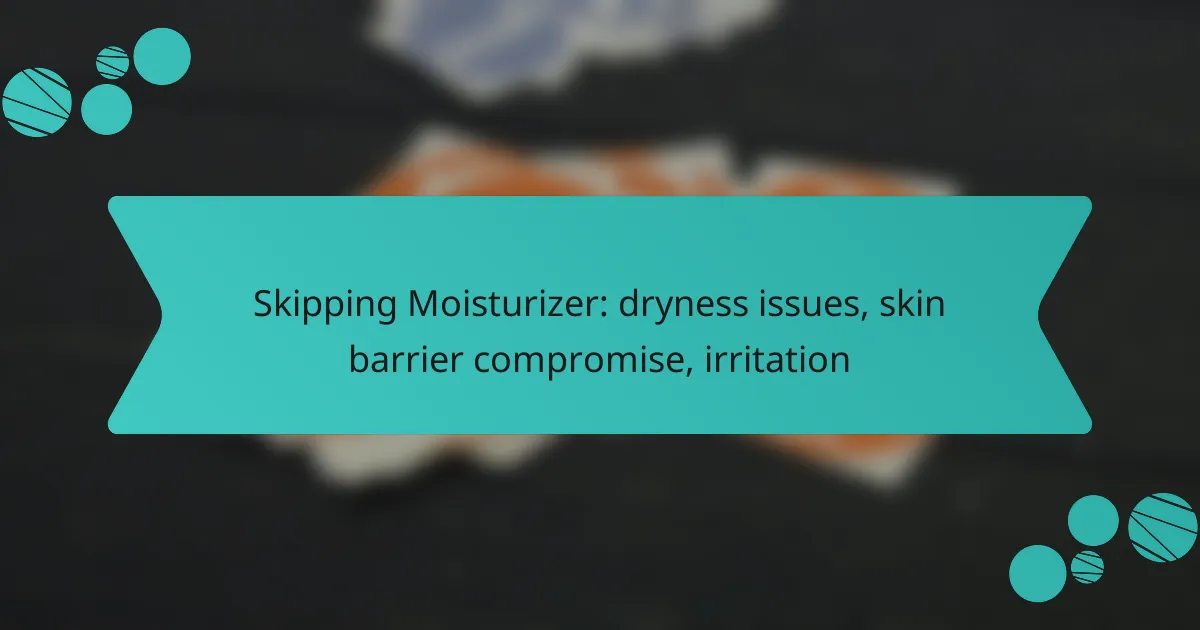Skipping moisturizer can lead to significant skin dryness and compromise the skin’s natural barrier, resulting in increased moisture loss and heightened sensitivity. This disruption can manifest as visible redness and irritation, making the skin more vulnerable to environmental stressors. To combat these issues, consider incorporating hydrating serums, facial oils, and humidifiers into your skincare routine.

What are the solutions for skipping moisturizer in London?
If you skip moisturizer in London, consider alternatives like hydrating serums, facial oils, and humidifiers to maintain skin hydration. These solutions can help combat dryness, support the skin barrier, and reduce irritation.
Hydrating serums
Hydrating serums are lightweight formulations that contain high concentrations of active ingredients, such as hyaluronic acid or glycerin, which attract moisture to the skin. They can be applied before or after other products, depending on your routine.
Look for serums specifically designed for hydration, ideally with a pH level that matches your skin’s natural acidity. Applying a hydrating serum in the morning and evening can significantly improve moisture levels.
Facial oils
Facial oils can provide a protective layer that locks in moisture, making them a great alternative to traditional moisturizers. Oils such as jojoba, argan, or rosehip are popular choices for their nourishing properties.
When using facial oils, apply them after your serum to seal in hydration. A few drops are usually sufficient, and they can be mixed with other products for enhanced benefits.
Humidifiers
Using a humidifier in your home can help combat the dry air common in London, especially during winter months. By adding moisture to the air, humidifiers can help maintain skin hydration and prevent dryness.
Consider placing a humidifier in your bedroom while you sleep for optimal results. Regularly clean the device to prevent mold and bacteria buildup, ensuring a healthy environment.
Regular exfoliation
Regular exfoliation helps remove dead skin cells that can contribute to dryness and irritation. Gentle exfoliants, such as chemical peels containing alpha-hydroxy acids (AHAs) or beta-hydroxy acids (BHAs), are effective options.
Exfoliate once or twice a week, depending on your skin type. Over-exfoliating can lead to irritation, so listen to your skin’s needs and adjust accordingly.
Patch testing new products
Patch testing new products is essential to avoid adverse reactions, especially if you have sensitive skin. Apply a small amount of the product on a discreet area, such as behind the ear or on the wrist, and wait 24 hours to check for irritation.
This simple step can help you identify potential issues before applying the product to your entire face, ensuring a safer skincare routine.

How does skipping moisturizer affect skin dryness?
Skipping moisturizer can significantly worsen skin dryness by disrupting the skin’s natural barrier. This leads to increased moisture loss, making the skin more susceptible to irritation and other issues.
Increased flakiness
When moisturizer is omitted, the skin often becomes flaky due to a lack of hydration. Flakiness occurs as dead skin cells accumulate, unable to shed properly without sufficient moisture. This can create an uneven appearance and may worsen with environmental factors like cold weather or low humidity.
To combat flakiness, consider using a gentle exfoliator once or twice a week. This helps remove dead skin cells while allowing for better absorption of any applied products.
Dehydration
Dehydration results from the skin losing more water than it can retain, leading to a tight and uncomfortable feeling. Without moisturizer, the skin’s ability to maintain hydration diminishes, which can exacerbate dryness and sensitivity.
To prevent dehydration, aim to drink adequate water daily and consider using a humidifier in dry environments. Look for moisturizers containing hyaluronic acid or glycerin, which can help attract moisture to the skin.
Rough texture
Skipping moisturizer can lead to a rough skin texture, making it feel coarse and uneven. This occurs as the skin barrier weakens and loses its ability to protect against external irritants, resulting in a compromised surface.
To improve skin texture, reintroduce a moisturizer into your routine, preferably one suited for your skin type. Products with ceramides can help restore the skin barrier and promote a smoother surface.

What are the signs of skin barrier compromise?
Signs of skin barrier compromise include visible redness, irritation, and increased sensitivity. These symptoms indicate that the skin’s protective layer is weakened, making it more susceptible to environmental stressors and irritation.
Redness and irritation
Redness and irritation are common indicators of a compromised skin barrier. When the barrier is weakened, blood vessels can become more visible, leading to a flushed appearance. This can be exacerbated by external factors such as harsh weather, pollution, or irritating skincare products.
To alleviate redness, consider using gentle, fragrance-free products that support skin healing. Avoiding hot water and opting for lukewarm temperatures during cleansing can also help reduce irritation.
Increased sensitivity
Increased sensitivity often accompanies a compromised skin barrier, making the skin react more intensely to products and environmental factors. Individuals may experience stinging, burning, or itching sensations even with mild formulations.
To manage sensitivity, it’s crucial to simplify your skincare routine. Focus on hydrating ingredients like hyaluronic acid and ceramides, and avoid active ingredients such as retinoids or acids until the skin barrier is restored.
Breakouts and acne
A compromised skin barrier can lead to breakouts and acne due to increased inflammation and disrupted oil production. When the barrier is weak, bacteria can penetrate more easily, leading to clogged pores and subsequent acne flare-ups.
To prevent breakouts, maintain a consistent moisturizing routine and avoid over-exfoliating. Incorporating non-comedogenic products can help keep pores clear while supporting the skin’s natural barrier function.

What causes irritation from skipping moisturizer?
Skipping moisturizer can lead to irritation due to compromised skin barriers, which results in dryness and increased sensitivity. When the skin lacks hydration, it becomes more vulnerable to environmental stressors and irritants.
Environmental factors
Environmental factors such as low humidity, extreme temperatures, and pollution can exacerbate skin irritation when moisturizer is omitted. Dry air, particularly in winter months, can strip moisture from the skin, leading to flakiness and discomfort.
To mitigate these effects, consider using a humidifier indoors during dry seasons and limit exposure to harsh weather conditions. Wearing protective clothing can also help shield the skin from environmental aggressors.
Skin type variations
Different skin types react uniquely to the absence of moisturizer. For instance, individuals with dry or sensitive skin may experience irritation more quickly than those with oily skin, which may retain moisture better.
Understanding your skin type is crucial for developing an appropriate skincare routine. If you have dry skin, prioritize daily moisturizing to maintain hydration and prevent irritation.
Product incompatibility
Using skincare products that do not work well together can lead to irritation, especially when moisturizer is skipped. For example, certain active ingredients like retinoids or acids can be harsh on bare skin, increasing the likelihood of redness and peeling.
To avoid product incompatibility, always layer products correctly and consider patch testing new items. If irritation occurs, reassess your routine and ensure that moisturizing is a consistent step to support your skin’s health.

What are the long-term effects of not moisturizing?
Not moisturizing can lead to several long-term skin issues, including accelerated aging, chronic dryness, and various skin disorders. Over time, neglecting to hydrate the skin can compromise its barrier function, making it more susceptible to irritation and damage.
Accelerated aging
Skipping moisturizer can significantly speed up the aging process of your skin. Without adequate hydration, fine lines and wrinkles may appear more pronounced, as dry skin loses its elasticity and plumpness. Regularly moisturizing helps maintain skin’s youthful appearance by supporting collagen production and preventing moisture loss.
To combat accelerated aging, choose a moisturizer with ingredients like hyaluronic acid or glycerin, which attract and retain moisture. Aim to apply moisturizer daily, especially after cleansing, to lock in hydration.
Chronic dryness
Chronic dryness is a common consequence of not moisturizing, leading to rough, flaky, and uncomfortable skin. This condition can affect anyone, regardless of skin type, and may worsen with environmental factors such as cold weather or indoor heating.
To alleviate chronic dryness, consider using a thicker cream or ointment, particularly in winter months. Look for products labeled as “hydrating” or “emollient” to ensure they provide sufficient moisture and barrier protection.
Skin disorders
Neglecting to moisturize can increase the risk of developing various skin disorders, such as eczema or dermatitis. These conditions often arise from a compromised skin barrier, which allows irritants and allergens to penetrate more easily.
To prevent skin disorders, incorporate a daily moisturizing routine that includes gentle, fragrance-free products. If you notice persistent irritation or redness, consult a dermatologist for tailored advice and treatment options.
